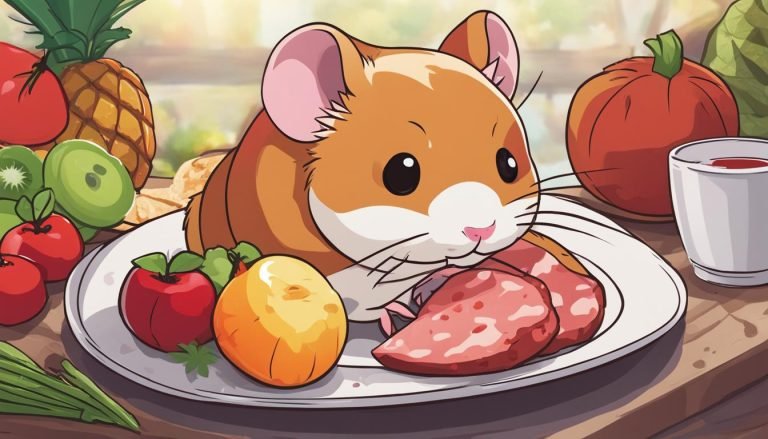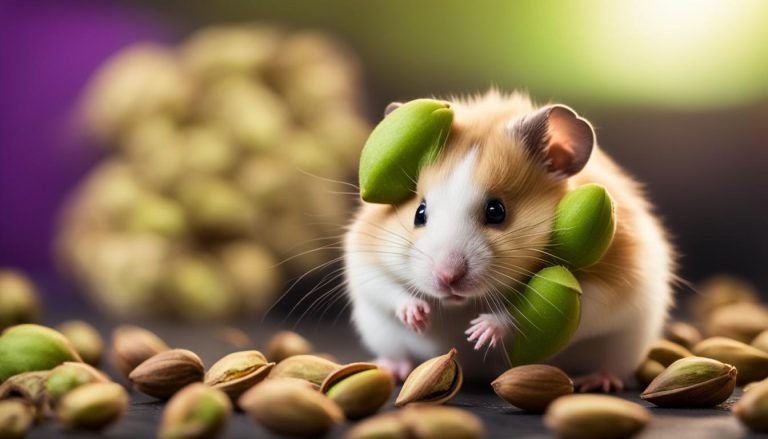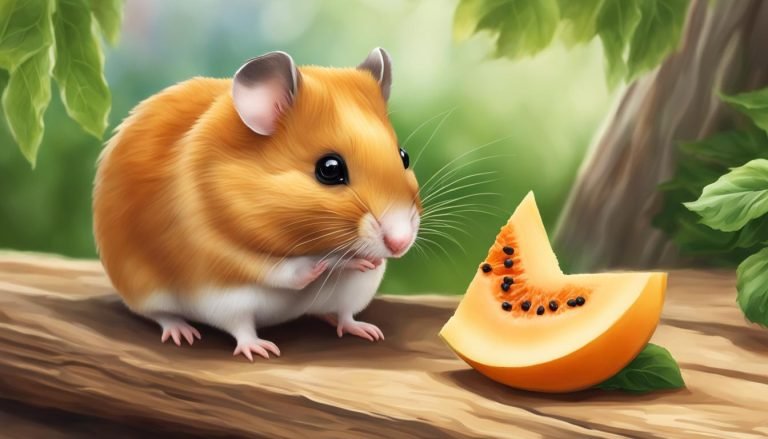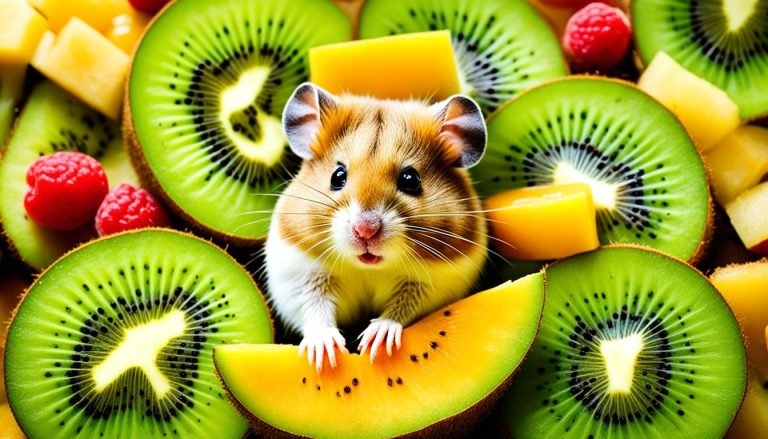Can Hamsters Eat Pecans? Nut Safety Guide
As a hamster owner, it’s natural to wonder what foods are safe for your furry friend. One common question that arises is whether hamsters can eat pecans. In this guide, I will provide you with all the information you need to know about pecans and hamsters.
Hamsters are natural omnivores, which means they can eat a variety of foods, including nuts. Pecans, in particular, are safe for hamsters to consume. However, it’s important to keep in mind that pecans should only be given as an occasional treat, alongside a well-balanced diet.
Pecans are high in fats, which can lead to weight gain if consumed in excess. To ensure your hamster’s health, it’s crucial to provide the majority of their diet from commercial pellets and fresh produce, and only offer pecans in small amounts.
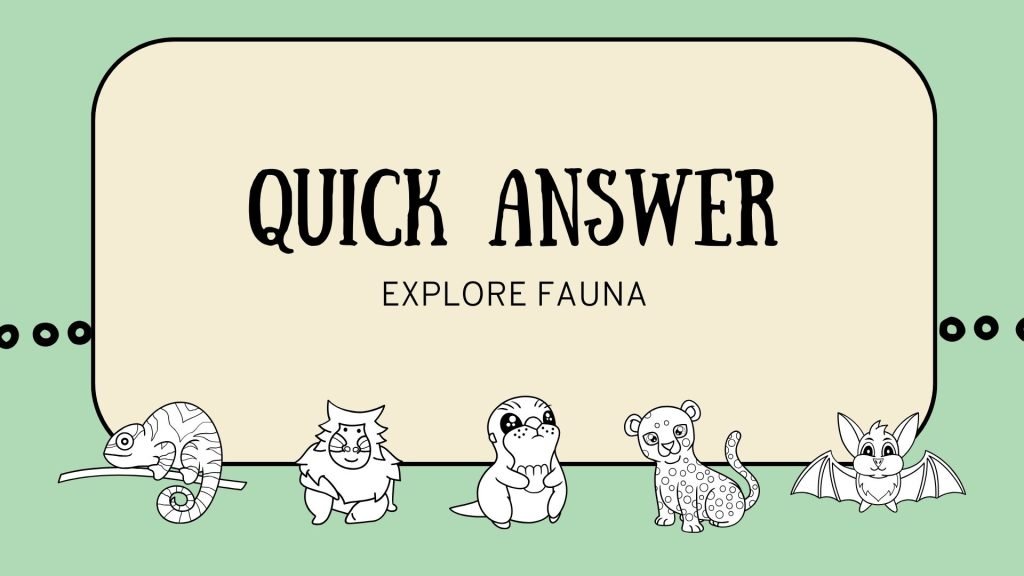
Can Hamsters Eat Pecans?
Yes, hamsters can eat pecans but you should give them pecans only as an occasional treat.
Key Takeaways:
- Pecans are safe for hamsters to eat, but should only be given as an occasional treat.
- Hamsters require a well-balanced diet consisting of commercial pellets and fresh produce.
- Pecans should be offered in small amounts to prevent weight gain.
- Dwarf hamster breeds, such as Chinese Dwarf Hamsters, should not be fed pecans.
- Consult with a vet for proper feeding guidelines and ensure your hamster’s health and well-being.
Hamsters’ Dietary Needs and Safe Foods
When it comes to keeping our furry hamster friends healthy and happy, their diet plays a crucial role. Providing them with a balanced and appropriate diet is essential for their overall well-being. As responsible pet owners, it’s important to understand the dietary needs of hamsters and know which foods are safe for them to consume.
Hamsters should primarily be fed a complete and balanced commercial pellet, specifically formulated for their nutritional requirements. These pellets provide a well-rounded base for their diet and ensure they receive the necessary vitamins, minerals, and protein.
In addition to pellets, it’s crucial to include Timothy’s hay in their daily meals. Hay helps to support their digestive system and maintain healthy teeth. Fresh water should always be available to keep them hydrated.
When it comes to fresh produce, hamsters can enjoy a variety of vegetables as part of their diet. Some safe options include broccoli, spinach, cauliflower, and carrots. These vegetables provide vitamins, minerals, and fiber that are beneficial for their overall health.
Foods to Avoid
While it’s important to offer fresh produce to hamsters, certain foods should be avoided. Onions, garlic, leeks, and any food from the Allium family should never be fed to hamsters, as they can be toxic to their system. Other foods to avoid include chocolate, which is toxic to most pets, and tomato leaves.
Furthermore, iceberg lettuce should be avoided due to its high water content, which can lead to diarrhea in hamsters. Similarly, citrus fruits like oranges should be given in moderation or avoided altogether, as they can also cause digestive issues.
Offering a Varied Diet
Providing a varied diet is essential to meet the nutritional needs of hamsters. As they can be picky eaters, offering a variety of safe foods helps prevent boredom and ensures they receive a wide range of nutrients. Remember to introduce new foods gradually to avoid digestive upset.
In addition to fresh produce, occasional fruits can be offered as treats. Some safe fruit options include apples (without the core) and bananas (in moderation). It’s important to remember that fruits can be high in sugar, so they should be given sparingly.
By understanding hamsters’ dietary needs and providing them with a safe and varied diet, we can help maintain their overall health and well-being. Always consult with a veterinarian for specific dietary recommendations and guidelines tailored to your hamster.
Pecans as a Safe Nut for Hamsters
Pecans are a safe and tasty treat option for hamsters when given in moderation. These nuts contain beneficial fats and vitamins that can contribute to a hamster’s overall health when consumed in small amounts. However, it’s important to note that not all hamster breeds can safely enjoy pecans.
Dwarf-sized hamster breeds, such as Chinese Dwarf Hamsters, do not require the additional sugar and fat found in pecans. Therefore, it’s best to avoid feeding pecans to these smaller hamster breeds.
For moderately sized hamsters, like Chinese hamsters, it is recommended to offer no more than ¼ of a pecan once a week or less. Larger hamster breeds, like the Syrian hamster, can be given up to ½ of a pecan once a week or less. This controlled portion size helps prevent excessive weight gain and ensures that the pecans remain a special treat in their diet.
In addition, it is crucial to never feed hamsters the shell of a pecan. Pecan shells can cause digestive damage if ingested, so always remove the shell before giving pecans to your furry friend.
Remember, while pecans can provide health benefits to hamsters in small quantities, they should always be given as a treat in addition to a well-balanced diet. Consult a veterinarian for feeding guidelines specific to your hamster’s breed and dietary needs.
Healthy Snacks for Hamsters
In addition to pellets and Timothy hay, hamsters can also enjoy small nibbles of fresh, washed produce. Including fresh produce in a hamster’s diet provides them with additional vitamins and fiber, promoting overall health and well-being.
- Apple slices: Offer apple slices without the core as a tasty and nutritious snack.
- Banana: While bananas can be a great treat, they should be given in moderation due to their high sugar content.
- Carrot: Carrots are a crunchy and vitamin-rich option that hamsters love.
- Carrot tops: Did you know that carrot tops contain even more vitamin C than the carrot itself? Including the leafy greens can provide an extra health boost.
- Cucumber: Cucumber slices are refreshing and hydrating for hamsters. Ensure they have no seeds, as they can pose a choking hazard.
- Parsley: Hamsters can enjoy small amounts of parsley, which adds flavor and essential nutrients to their diet.
- Leafy greens: Spinach and lettuce leaves are great options for hamsters. They provide additional fiber and essential vitamins.
Incorporating these healthy snacks into your hamster’s diet can provide variety and enrichment, while also meeting their nutritional needs. Remember to wash and prepare the produce properly before offering it to your furry friend.
Moderation and Proper Feeding Guidelines
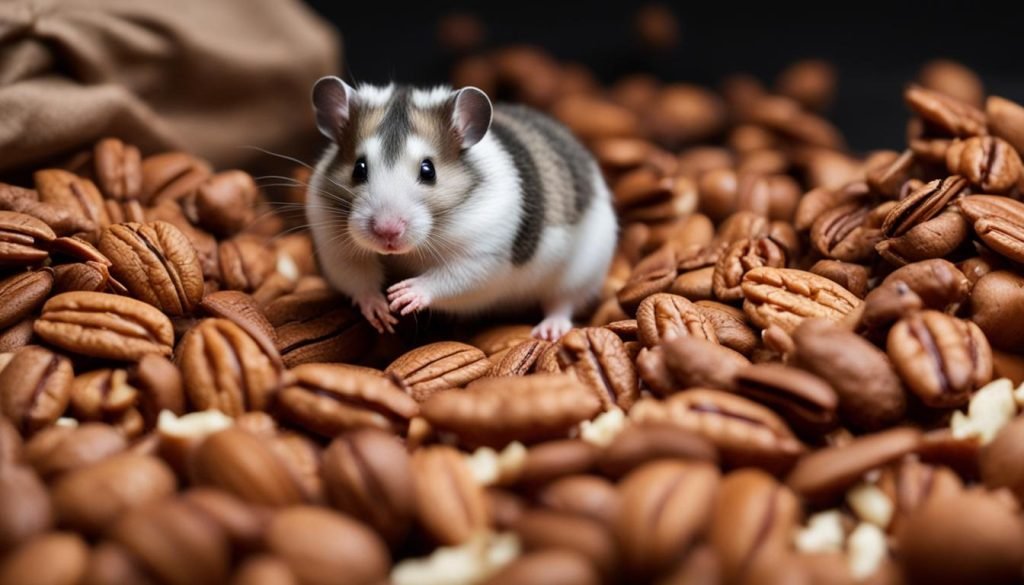
When it comes to incorporating pecans into a hamster’s diet, moderation is key. Proper feeding guidelines should be followed to ensure the health and well-being of your furry friend.
The amount of pecans given to hamsters should be based on their size and breed. Smaller hamsters require less sugar and fat, so it’s important to adjust the serving accordingly. Breaking pecans into small pieces and mixing them with their regular diet is a great way to introduce these nuts into their meals.
Pecans should only be given to hamsters once a week or less to prevent overconsumption. It’s crucial to remember that pecans should be offered as a treat and not as a staple in their diet. Rotating other healthy treats in their diet is essential to provide balanced nutrition. Always consult with a veterinarian before introducing any new foods or making changes to your hamster’s diet.
Proper Feeding Guidelines for Hamsters:
- Feed pecans in moderation, based on the hamster’s size and breed.
- Break pecans into small pieces and mix them with the hamster’s regular diet.
- Offer pecans as an occasional treat, not as a daily staple.
- Rotate other healthy treats to provide a balanced diet.
- Consult with a veterinarian before making any changes to your hamster’s diet.
By following these moderation and proper feeding guidelines, you can safely incorporate pecans into your hamster’s diet and provide them with a variety of nut options.
Final Thoughts
In summary, hamsters can safely eat pecans, but it is important to do so in moderation. Pecans should only be given as an occasional treat alongside a balanced diet of commercial pellets, hay, and fresh produce. While pecans are high in fat, they also contain beneficial nutrients, making them a tasty and nutritious addition to a hamster’s diet.
It is crucial to consider the breed and size of your hamster when determining the appropriate amount of pecans to offer. Dwarf hamster breeds should avoid pecans altogether due to their higher susceptibility to weight gain. Larger hamster breeds can have small amounts of pecans once a week or less.
Remember to remove the shell completely when feeding pecans to your hamster, as it can cause digestive issues. If you have any concerns or questions regarding the feeding guidelines for pecans or any other aspect of your hamster’s diet, it is always best to consult with a veterinarian. They can provide you with personalized advice based on your hamster’s unique needs, ensuring their health and well-being.
Similar Posts
- Can Hamsters Eat Kiwi? Nutritional Facts Guide
- Can Hamsters Eat Brussels Sprouts: Safe or Not?
- Can Hamsters Eat Rice? Safe Pet Feeding Tips
- Can Hamsters Eat Potatoes? Safe Snacks Explained
- Can Hamsters Eat Pistachios? Safe Snacks Guide
- Can Hamsters Eat Mushrooms? Safety Guide
- Can Hamsters Eat Mealworms? Safe Snack Guide
- Can Hamsters Eat Crackers? Safe Snack Tips.
- Can Hamsters Eat Asparagus? Safe Feeding Guide
- Can Hamsters Eat Peaches? Safe Snacking Tips
- Can Hamsters Eat Cilantro? Safe Herb Guide
- Can Hamsters Eat Cantaloupe? Find Out
- Can Hamsters Eat Avocado? Diet Safety Tips
- Can Hamsters Eat Pineapple? Safe Snack Guide
- Can Hamsters Eat Green Beans? A Complete Guide


